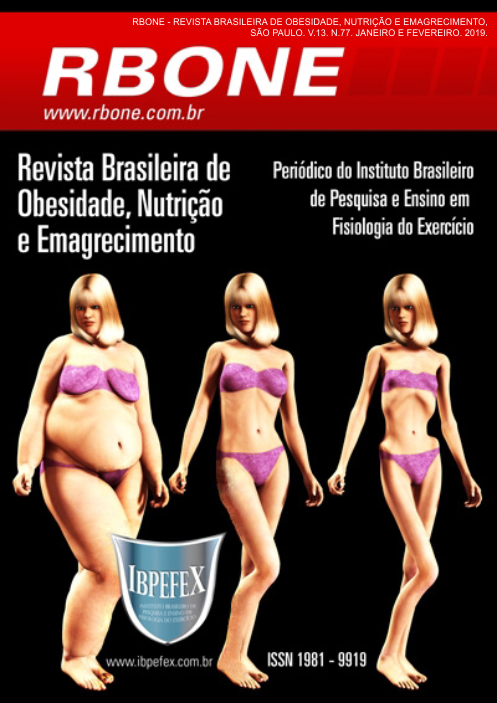Evaluation of consumption of energy drinks by students of a university of São Paulo-SP
Abstract
Introduction: Recently, it has been observed a fast popularization in the consumption of energy drinks in order to improve the performance, resistance and alertness, to stimulate the metabolism and sensation of well-being, to diminish the drowsiness and to help in the elimination of harmful contents to the organism. However, its overuse can cause health damage like arrhythmias and sudden death, especially when consumed with alcohol. Objective: In this context, this study evaluated the consumption of energy drinks by students of a university in the city of São Paulo. Method: This is a cross-sectional study of 200 adult individuals of both genders, students from a private university in São Paulo. A questionnaire containing information on the consumption habits of energy drinks was applied. Results: The consumption of energy drinks was reported by 67.5% of the interviewees, mainly to stay awake (38%), because they liked the taste of the drink (32%) and with a stimulating purpose (20.5%). Among the occasions when young people consumed energy drinks, most (38%) cited parties, followed by bars (32%) and night clubs (20.5%). Most college students used beverages in combination with whiskey (25%), vodka (55%) or beer (8%). It is concluded that most of the interviewees consume energy drinks, and often the intake is associated with alcohol. Conclusion: Thus, it is suggested that the population knows the products they consume so that they can enjoy them properly.
References
-Arria, A.M.; Caldeira, K.M.; Kasperski, S.J.; Vincent, K.B.; Griffiths, R.R.; O'grady, K.E. Energy Drink Consumption and Increased Risk for Alcohol Dependence. Alcohol Clin Exp Res. Vol. 35. Num. 2. 2011. p. 365-375.
-Ballistreri, M.C.; Corradi-Webster, C.M. Consumption of energy drinks among physical education students. Rev Latino-am Enfermagem. Vol. 16. 2008. p. 558-564.
-Buchanan, J.C.; Pillon, S.C.; O uso de drogas entre estudantes de medicina em Tegucigalpa, Honduras. Rev Latino-am Enfermagem. Vol. 16. 2008. p. 596-600.
-Brasil. Ministério da Saúde, Agência Nacional de Vigilância Sanitária. Resolução Diretoria Colegiada RDC n° 273, de 22 de set. de 2005. Aprova O "Regulamento Técnico Para Misturas Para O Preparo De Alimentos E Alimentos Prontos Para O Consumo". D.O.U. Diário Oficial da União; Poder Executivo, DF, 23 set. 2005. Brasília. 2005.
-Carvalho, G.P. Lançamento de Marcas: a influência dos preços e dos benefícios informativos/utilitários na participação do mercado de energéticos. Trabalho de conclusão de curso apresentado para obtenção do título de Bacharel em Administração. Universidade de Brasília. 2011. 48p.
-Carvalho, J.M.; Maia, G.A.; Sousa, P.H.M.; Rodrigues, S.; Perfil dos principais componentes em bebidas energéticas: cafeína, taurina, guaraná e glucoronolactona. Rev Inst Adolfo Lutz. Vol. 65. Num. 2. 2006. p. 78-85.
-Conselho Nacional de Saúde. Resolução nº 466/2012, de 04 de dezembro de 2012. Diretrizes e Normas Regulamentadoras de Pesquisas Envolvendo Seres Humanos. Brasília. 2012.
-EXAME. Mercado de bebidas energéticas projeta crescimento de até 15% para os próximos anos. 2017. Disponível em: https://exame.abril.com.br/negocios/dino/mercado-de-bebidas-energeticas-projeta-crescimento-de-ate-15-para-os-proximos-anos-dino89095786131/.
-Ferreira, S.E.; Mello, M.T.; Formigoni, M.L.O.S. O efeito das bebidas alcoólicas pode ser afetado pela combinação com bebidas energéticas? Um estudo com usuários. Rev Assoc Med Bras. Vol. 50. Num. 1. 2004. p. 48-51.
-Giles, E.G.; Mahoney, C.R.; Brunyé, T.T.; Gardony, A.L.; Taylor, H.A.; Kanarek, R.B. Differential cognitive effects of energy drink ingredients: Caffeine, taurine,and glucose. Pharmacology, Biochemistry and Behavior. Vol. 102. 2012. p. 569-577.
-Gómez-Miranda, L.M.; Bacardi-Gascon, M.; Meza, N.Y.C.; Cruz, A.J. Consumo de bebidas energéticas, alcohólicas y azucaradas en jóvenes universitarios de la frontera México-USA. Nutr Hosp. Tijuana. Vol. 31. Num. 1. 2015. p. 191-195.
-Pennay, A.; Lubman, D. Alcohol and energy drinks: a pilot study exploring patterns of consumption, social contexts, benefits and harms. BMC Research Vol. 5. Num. 369. 2012. p. 1-10.
-Valle, M.T.C.; Avaliação da neurotoxicidade de bebidas energéticas contendo cafeína e taurina em ratos. Universidade Federal do Rio Grande do Sul. Dissertação de Mestrado em Neurociências. Rio Grande do Sul. 2015.
Authors who publish in this journal agree to the following terms:
- Authors retain the copyright and grant the journal the right of first publication, with work simultaneously licensed under the Creative Commons Attribution License BY-NC which allows the sharing of the work with acknowledgment of the authorship of the work and initial publication in this journal.
- Authors are authorized to enter into additional contracts separately for non-exclusive distribution of the version of the work published in this journal (eg, publishing in institutional repository or book chapter), with acknowledgment of authorship and initial publication in this journal.
- Authors are allowed and encouraged to post and distribute their work online (eg, in institutional repositories or on their personal page) at any point before or during the editorial process, as this can bring about productive change as well as increase impact and impact. citation of published work (See The Effect of Free Access).






